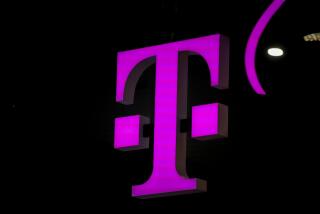2 European Firms to Buy 20% of Sprint : Communications: French and German phone monopolies will spend $4.2 billion for the stake in the U.S. long-distance carrier, helping it to compete with AT&T; and MCI.
- Share via
Jockeying for a better position in the increasingly competitive world telecommunications market, the telephone monopolies of France and Germany said Tuesday that they will spend $4.2 billion for a 20% stake in Sprint Corp., America’s third-largest long-distance carrier.
The investment by Deutsche Telekom and France Telecom, if approved by regulatory authorities in each country, will give Sprint the global reach and financial muscle it needs to compete with market leaders AT&T; and MCI.
The new alliance will assume “a leading role in the world league of telecommunications,” said Helmut Ricke, chairman of Deutsche Telekom. He said Sprint will help the German telecommunications giant crack the U.S. market and tackle emerging Asian markets.
The three partners plan to create “regional operating groups” around the world that would use their combined resources to offer package deals on international telecommunications services to business and residential long-distance customers.
“This partnership will create the single-source provider with global account responsibility that the marketplace is looking for,” said William Esrey, Sprint chief executive.
Wall Street responded coolly to the widely rumored deal because Sprint would receive the money later than previously expected, S.G. Warburg analyst William Deatherage said.
France Telecom and Deutsche Telekom together would buy 42.9 million shares of a new class of Sprint shares for $2.03 billion next April. A similar number of shares would be purchased for up to $2.19 billion two years later.
But Deatherage and other analysts following Sprint have reiterated their “buy” recommendations for the stock, which fell $2.75 to close at $37.125 in New York Stock Exchange trading.
The deal comes just a week after Sprint, based in Kansas City, Mo., broke off merger talks with computer integration leader EDS Corp. The talks failed when General Motors Corp., EDS’ parent, refused to value Sprint at the high premium the European telecommunications companies had agreed to pay in preliminary talks.
Sprint’s new deal may face tough obstacles. Regulatory approval by the Justice Department and the Federal Communications Commission could be delayed or denied because of U.S. concerns over the inaccessibility of Europe’s telecommunications equipment and service markets.
“There’s something very wrong when telephone companies like the France Telecom and Deutsche Telekom monopolies can buy into the U.S. telecommunications market while keeping their home markets closed tighter than a drum,” said Victor Pelson, chairman of AT&T; Global Operations. “We urge the United States government to condition approval of the proposed equity investments in Sprint on the French and German governments’ opening their telecommunications markets.”
AT&T; raised similar objections last year when British Telecom announced it would pay $4.3 billion for a 20% stake in MCI. The MCI deal has yet to be approved by U.S. regulatory authorities, but analysts say its chances are good because Britain is relatively open by European standards.
The French and German monopolies’ investment in Sprint is both an outward push and a response to increasing competition in their own markets for large business customers from new local and international players.
“France Telecom is a major player in data services,” said USC telecommunications expert Bill Davidson. “When combined with Sprint, they will be formidable.”
Analysts say Sprint, which had $11 billion in revenue last year, and its monopoly partners face a huge challenge in merging their cultures.
“Sprint is the little yapping dog that won’t let go,” said Jay Batson, senior analyst at Forrester Research in Cambridge, Mass. “They are very tenacious and aggressive. That’s very different from the way the monopolies have had to think.”
A Distant Third Sprint is far behind industry leaders AT&T; and MCI in the fiercely competitive long-distance phone business. The U.S. market share of the carrriers, based on annual sales:
AT&T; 60% MCI 20% Sprint 10% Other 10% Source: Company reports






